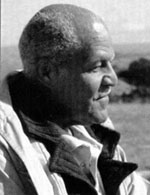|
Samuel Washington Allen Samuel Allen was born at Columbus, Ohio on December 9, 1917. His father was a clergyman. He attended Fiske University where he studied with James Weldon Johnson. He received his degree from Fiske in 1938 and went on to study law at Harvard where he received his law degree in 1941. He later did graduate work at the the New School for Social Research (1947-1948) and the Sorbonne in Paris (1949-1950), where made use of the GI Bill. Allen was Deputy Assistant District Attorney in New York City from 1946 to 1947, a civilian attorney with the U.S. Armed Forces in Europe (1951-1955), and in private practice in New York from 1956 to 1958. He taught law at Texas Southern University from 1958 to 1960. In 1961, he was appointed to the position of assistant general counsel of the U.S. Information Agency and served in that position until 1964. He was then named chief counsel of the Community Relations Service in Washington, D.C., a position he occupied from 1965 to 1968. In 1968, he was named Avalon Professor of Humanities at the Tuskegee Institute, where he taught for two years. In 1971 he became a professor of English at Boston University where he taught until he retired in 1981. Allen also taught at Wesleyan University (1970-1971) and was writer-in-residence at Tuskegee and at Rutgers University. Allen's poems were first published by Richard Wright in the journal, Présence Africaine, and his poetry is today found in many anthologies. He sometimes wrote under the name Paul Vesey. Allen was also a reviewer, translator, editor and lecturer. His translations include Jean-Paul Sartre's Orphee Noir and Leopold Senghor's Anthologie de la Nouvelle Poesie Negre. [Source: Obituary, "Samuel Washington Allen (aka Paul Vesey), Class of 1938," Fisk University] Poetry Samuel W. Allen, Elfenbeinzahne: Gedichte eines Afroamerikaners (Heidleberg, Germany: Wolfang Rothe 1956)(bilingual edition)("Ivory Tusks")(under pseudonym Paul Vesey) _____________, Ivory Tusks and Other Poems (New York: Poets Press, 1968) _____________, Paul Vesey's Ledger (Detroit: Broadside Press, 1975)(London: Paul Breman, 2nd ed., 1975) _____________, Every Round and Other Poems (Detroit: Lotus Press, 1987)
Writings Samuel W. Allen (ed.), Poems from Africa (New York: Crowell, 1973) _____________, "Négritude and Its Relevance to the American Negro Writer," in The American Negro Writer and His Roots: Selected Papers 8-20 (New York: American Society of African Culture, 1960) _____________, "Introduction," to Pan-Africanism Reconsidered (Berkeley: University of California Press, 1962) _____________, Two African Writers: Soyinka and Senghor (Bloomington, Indiana: Author, 1966) __________, "Introduction," to Naseer Aruri & Edmund Ghareeb (eds.), Enemy of the sun: Poetry of the Palestinian Resistance (Drum & Spear Press, 1970) Translation Jean Paul Sartre, Black Orpheus (Presence Africaine, 1960)(Samuel Allen trans.) Research Resources Two Audio Reels of Recordings |
